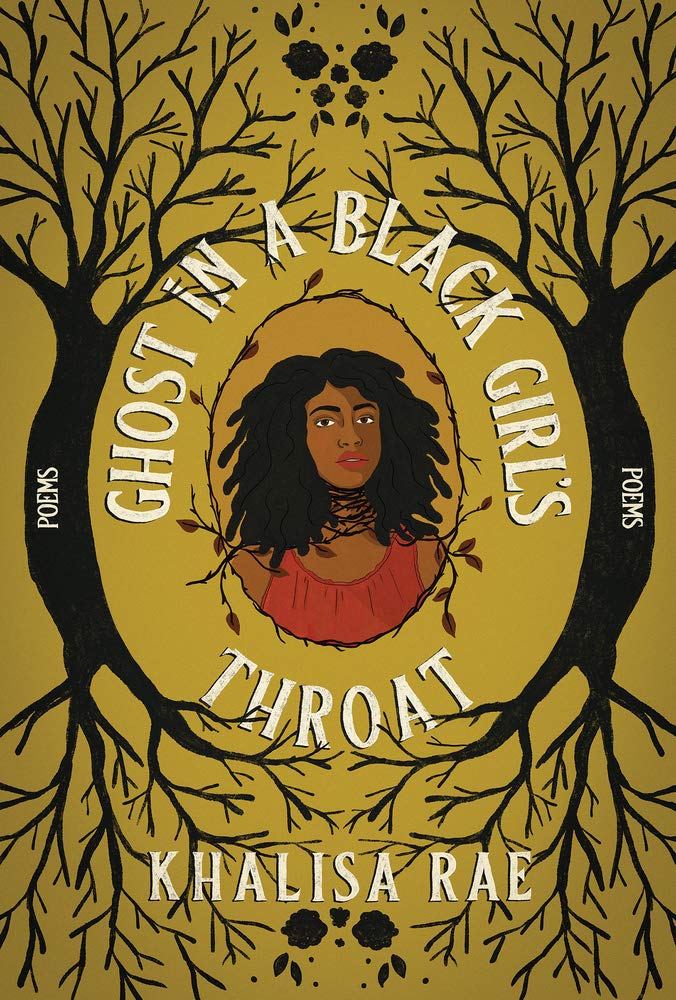
REVIEW BY GABINO IGLESIAS
—
Khalisa Rae’s Ghost in a Black Girl’s Throat is like a newborn scream that’s been held in for eons. Sharp, strong, unapologetic, beautiful, and angry, the writing in this collection is a celebration of language and rhythm, and the words on the page run like the blood from a wound caused by racism. Rae tackles bigotry, dismantles the innate inequalities of the American Dream, takes the South to task for its history, puts a spotlight on microagressions, and screams in righteous indignation. Then…well, then the first poem is over. Sounds like too much, I know, but that’s exactly what she does. Here, as proof, is the opening of the poem that titles the collection, “Ghost in a Black Girl’s Throat”:
The South will birth a new kind
of haunting in your black girl-ness,
your black woman-ness becomes
a poached confection—honeyed enigma?
pledging to be allegiant. The muddied silk robe
waving in their amber grains of bigotry. Your skin—
a rhetorical question, bloodstained equation?
no one wants to answer. You will be the umber,
tawny, terracotta tongue spattered on their American
flag, beautiful brown-spangled anthem. You will be
the bended knee in the boot of their American
Dream, and they will stitch your mouth the color
of patriarchy, call it black girl magic when you rip
the seams. Southern Belle is just another way to say:
stayed in her place on the right side of the pedestal.
As a person of color, I’ve always been wary of the “I don’t see color” crowd because hearing I don’t see color strikes me not as an anti-racist sentiment but more as a denial of racism, like it’s a problem we no longer have to fight against because whoever uttered those words is better than that. It’s also a line that more or less translates to “I don’t see color…so I don’t see the bigotry, the history, the fear, the injustice, or the systemic racism.” Ghost in a Black Girl’s Throat is the opposite of that phrase, and it is ware of that phrase. In fact, Rae has a line that embodies everything I’ve said so far: “Saying: I don’t see color means, I don’t see you.” The poems here are a hand that comes up to teach a lesson to a hand that moves toward a Black woman’s hair while a voice says “I love your hair! Can I touch it?” This collection is rooted in the Black experience, in the realities, history, beauty, and fears of the Black female body. Take the first of the dozen entries that make up “Guidebook for Those Considering the South Home”:
Long back roads?
still rattle me.
Make me fear being asked to step out—?
the night stick, the gun. Body turned to roadkill,
left on the curb. Forgotten.
No poet exists in vacuum, but writing poetry that is at once personal and universal is no easy task. Rae does that here, and the result is a book that demands to be read with clenched fists and an open heart. Rae is at the center of most of the writing here, but she has deep roots that dig into the country’s past, that dig into slavery as well as more recent events that showcase the disparities that still lie at the core of our society like cancerous tumors. The poems here speak of Rae, but they also speak of experiences that many gave faced as children, in college, and as adult women. They’re also poems that jump between history and the present to decry contemporary issues with deep historical roots:
“………..Why you keep stealing?
our blues and calling it a pop song?
Convincing the masses you made our pain
fashion statements. Our twerk be copywritten,
you get no royalties from our two-step.?
Our lingo isn’t for sale, so stop plagiarizing
our hood-speech, mainstreaming our “broken”
English. This America be mass producer
of appropriation, factory full of our features, ripping
our packages open searching for damaged goods.
This black be authentic. This black be original.?
This melanated music be off-market.
This slang be sold out and never returning to shelves.
This dialect be discontinued, this black too high.
Out of reach.”
Of children, Rae says “They will never know where they’re headed/until they see all the immaculate places/they’ve come from.” This line is an invitation to share history, to use the past as a way to build a better future while never losing sight of what came before in order to never again make the same mistakes. In that regard, this collection is not just one all fans of poetry should read; it’s one we should be assigning in schools.
—
Gabino Iglesias is a writer, editor, literary critic, and professor living in Austin, TX. He is the author of ZERO SAINTS and COYOTE SONGS. You can find him on Twitter at @Gabino_Iglesias.
![[PANK]](https://pankmagazine.com/wp-content/themes/pank/assets/images/pank-logo-large.png)
